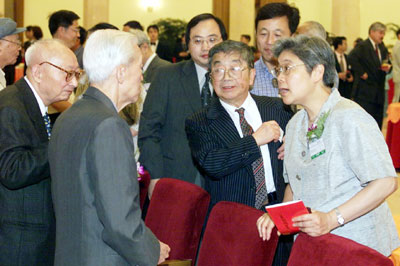Profiles
Veteran journalist's legacy lasts
(China Daily)
Updated: 2006-02-02 07:20
 |
Large Medium Small |
In so doing, China Daily established itself among domestic newspapers for the unique style of photo editing and set itself as role model for others to follow.
"Looking back now, I realize that we succeeded because we dared to adapt foreign things to Chinese needs and never bothered to be fettered by existing practice," Feng recalled in an essay he wrote in 2001 for the photo album, "China Chronicle."
 Feng Xiliang, former editor-in-chief of China Daily (second from left), former publisher Jiang Muyue (first from left) and Tang Wensheng (right), former deputy editor-in-chief, chat at a grand reception in the Great Hall of the People in Beijing May 31, 2001 to celebrate China Daily's 20th founding anniversary. [newsphoto] |
In 1984, Feng was awarded the Missouri Honour Medal for Distinguished Service in Journalism by the Missouri School of Journalism, for his lifetime achievements and distinguished services in his journalistic endeavours.
After graduating with a BA in journalism from St. John's University in 1943, Feng pursued his further studies at the Missouri School of Journalism, earning his MA in journalism in 1948. He then continued at Columbia University with his focus on graphic art.
In 1950, he returned home to join Beijing International News Department and started his lifelong profession of reporting China to the outside world.
He started as world news editor and became managing editor of People's China, an English language magazine. Between 1958 and 1978, he worked as international news editor and then deputy editor-in-chief of the weekly news magazine Beijing Review.
In 1978, he became a member of the four-man commission for the founding of New China's first national English language newspaper, the China Daily.
In retirement, he served as the paper's editor emeritus and special advisor and chairman of the China Daily Distribution Corporation in New York. He was also invited to join the advisory board of the Window news magazine in the early 1990s and later the South China Morning Post in Hong Kong.
For years after 1986, he was also a member of the National Committee of the Chinese People's Political Consultative Conference.
He was survived by his wife and daughter.
(China Daily 02/02/2006 page2)